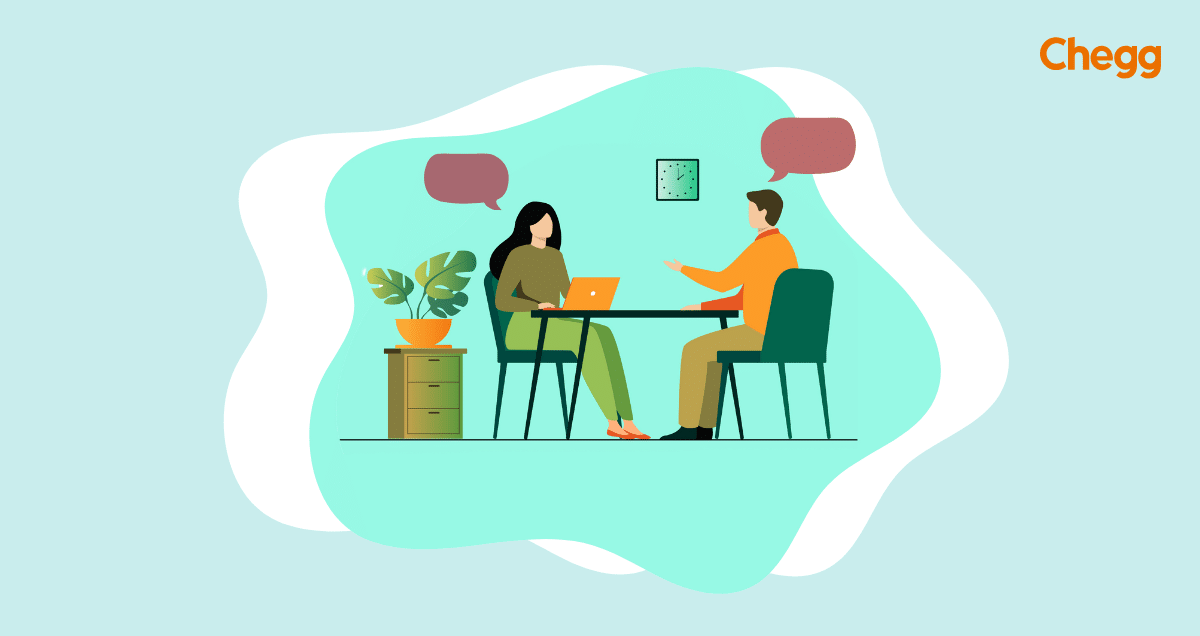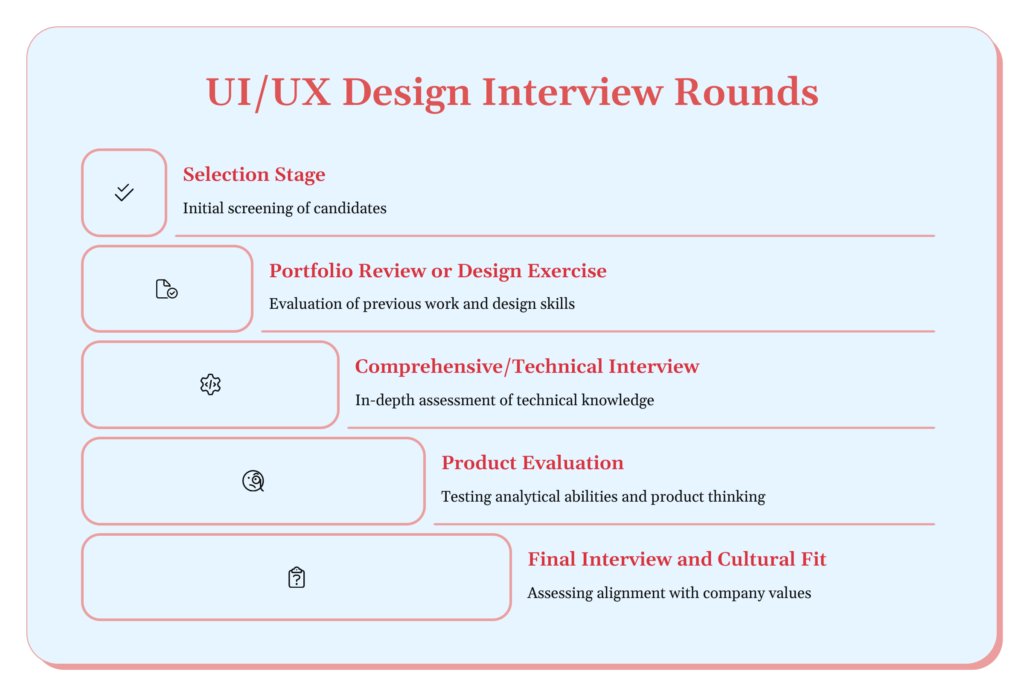

Quick Summary
Every candidate who wants to become a UI UX designer should exercise rigorous preparation in modern competitive job markets for a job interview. As UI and UX designs rapidly evolve, interviewers seek candidates with both technical skills and a creative, user-centric approach.
UI UX interview questions vary depending on the position and experience level. For designers, the questions would be related to design principles, tools, and methodologies. The questions for developers would be on the lines of implementation of designs and front-end technologies. Freshers could be asked questions on concepts of UI UX and passion for the field.
Common UI UX interview themes would be design processes, user research, and prototyping or how this prototype will work with other teams/users. In response to UI UX interview questions, interviewers usually look for people who can explain their design decisions, receive and act on feedback, and keep themselves updated with the industry.
Study potential questions, and be prepared with thoughtful responses to showcase your expertise and passion for UI UX design. This guide will help you navigate basic ui ux interview questions for UI UX designers, from common knowledge to advanced techniques, ensuring you’re as prepared as possible to make a great impression at your interview.

When preparing for UI UX interview questions, it’s important to have clear, concise answers for common queries. Be ready to address key topics often covered in UI UX interview questions, demonstrating your experience and knowledge in the field. Some frequently asked questions include:
The UX design addresses the journey and interaction with the product from end to end, while the UI design is all about the feel and look of the product itself.
I begin from an informed place through project goals, user research, personas, defining user flows, wireframing, prototyping, and iterative design based on feedback.
My process involves informed research, ideation, wireframing, prototyping, testing, and iterative refinement while on the path—and making it a collaborative process with the stakeholders to ensure that it remains on course with the goals of the project.
I am good with every principal design tool used in the industry, which includes Sketch, Figma, and Adobe XD, and the prototyping tools comprising InVision or Proto.io. Other tools include UsabilityHub for user testing. Be prepared to discuss your experience with these tools in response to UI UX interview questions.
I keep up-to-date by reading design blogs, attending events, joining online communities, and personally practicing with new tools.
UI UX designers will face specific UI UX interview questions about their design expertise, covering user research, surveys, interviews, and usability tests. They will also discuss test plans, moderation, and turning findings into actionable insights for design decisions.
I have conducted user research methods, from surveys and interviews to usability tests. I work with tools like UserTesting.com to analyze results and inform design decisions. I have created test plans, moderated sessions, and synthesized findings into actionable insights.
I view feedback as something that will help me improve. I listen, ask questions for clarity, and then make adjustments to the visual design with this constructive criticism in mind. Well, it’s all feedback for me and one has to have an open mind on how to build a great user experience.
One project faced tight deadlines and developed conflicting stakeholder requirements. I ran an expectation alignment workshop for all stakeholders, allowing prioritization of features against user needs. I used rapid prototyping to quickly iterate on ideas for how it might function/work. We could deliver the solution on time by adopting this approach and meeting key stakeholders.
I follow the WCAG guidelines concerning appropriate color contrast, alternative text for images, and designing for navigation by the keyboard. I also conduct usability testing among various groups of users, including those who have disabilities, to know that our designs are accessible.
I do the mobile-first design for the small screens and then progressively enhance for the big ones. Flexible grids, responsive images, and CSS media queries are used to present content in the best way on all devices. This considers content priority and touch-friendly interactions for mobile users.
These are common UI UX interview questions that focus on the technical implementation approach, including how UI UX developers translate designs into code, handle front-end technologies, and ensure the functionality and responsiveness of user interfaces in real-world applications.
Well, first I break down the design into components. After that, I created the basic structure using HTML and styled it with CSS. Then add interactivity with JavaScript. Finally, I make sure it looks right across different browsers and devices.
I know technologies like HTML, CSS, and JavaScript. In terms of user interface building, I use React or Vue.js. Sass for improved management of CSS code, and Git for version control.
We once had a problem with a layout on high-end mobile devices. I used the browser tools to find out the cause—a CSS Flexbox issue. It was fixed by another approach to CSS on specific devices. There I learned why test cases are very important.
I meet with designers, sit in on design meetings, and I am keeping up with the designs using tools like Figma. I think at the same time, it’s important to have and maintain style guides in order to keep things uniform throughout the project.
Knowing that how long a request takes is one of the myriad important, yet simplistic, parameters, I comprehensively handle the problems through load-time reduction via reduced requests and image optimization, along with firing only when required. I find and fix the slow spots using caching and browser tools. Regular testing keeps the site running smoothly.
Below are UI UX interview questions for freshers that evaluate their understanding of basic concepts, such as design principles, user experience, and the tools used in UI UX design. These questions help assess their foundational knowledge in the field.
I am passionate about making digital experiences intuitive and enjoyable. What interests me the most in UI UX design is the rich combination of creativity and problem-solving, availability, and the possibility of a positive influence on users’ lives through careful design.
I stay current with the industry by following blogs like UX Booth and the Nielsen Norman Group, joining online design communities such as Dribbble, and attending webinars and virtual conferences for further learning. Personal projects have allowed me to practice new skills and learn new design tools and software.
While still in school, I redesigned a website for a local nonprofit to improve navigation and accessibility. I did the user interviews for them, wireframed and prototyped it, and then produced this design in WordPress. This is just one example of where user-centered design and iterative improvement happen.
User-centered design is a process that focuses on understanding and meeting user needs down the design line. It engages users in the research, testing, and feedback stages with the intent to ensure the final product lives up to their needs and preferences.
I will start by researching users to understand the target audience and their needs. Then, I will follow up by working on the personas of the users and their journeys, rough ideation with sketching, making wireframes and prototypes, testing for usability, and then iterating based on feedback. All of this will be done bearing in mind mobile-specific design principles.
Below are more challenging UI UX interview questions and answers, designed to test a candidate’s deeper understanding of design processes, problem-solving abilities, and technical expertise. These questions go beyond basics, assessing advanced skills in UI UX design.
I use both quantitative and qualitative metrics. Quantitatively, metrics such as conversion rates, completion task times, and user engagement. Qualitatively, the analysis follows from feedback received from user testing sessions and surveys. I look at business goals and how well the design meets those. Success is about improving the user experience while attaining business objectives.
The key principles concern usability, accessibility, consistency, clarity, efficiency, and emotional appeal. Good UX means a design should be intuitive, it satisfies user needs, and, in addition, evokes positive feelings. It should be inclusive, thus accommodating users of different abilities and backgrounds. Such design patterns set consistency, which enables a user to navigate the product easily. Clarity in information architecture sets the scene for better understanding.
I prioritize requirements against user and business needs, using data from user research and analytics to make those decisions. If these are at variance with one another, I will discuss them with the stakeholders to arrive at a compromise. I’ll do multiple design options if need be, to show the trade-offs involved in helping with decisions.
I have experience working with Axure RP in making complex interactions, Sketch for UI design, and InVision for clickable prototypes. I am using the tools based on project needs and by preferences of teams. I use tools like Figma or Adobe XD very often for rapid prototyping, offering the capability to easily run fast iterations and share them with stakeholders.
I collect feedback in many ways – usability testing, questionnaires, and analytics. This would help me understand the trends in that dataset, and changing priorities. In doing so, it shall create a feedback loop wherein insights from users become the input for design iterations. The stakeholders also get involved in checking this user feedback for consistency with business goals.


The field of UI UX design is evolving rapidly, with new trends shaping the way users interact with digital products. Here are the key UI UX design trends expected to dominate in 2025:
These trends will shape the future of digital experiences, making UI UX design more intuitive, accessible, and user-centric.
Study common UI UX interview questions and practice your responses. They should relate all of your skills and experiences, but those ideas should be original and include real examples from work experience. Conduct mock interviews so that feedback is received on how you come across your portfolio. Come prepared with questions regarding the role and company in order to show interest.
As industries continue to evolve, brands like IndiGo are revamping their digital platforms with fresh UI/UX designs, emphasizing user experience. This shift is driving a growing demand for skilled UI/UX designers who can create lean, seamless interfaces.
Proper preparation and the right mindset are what will guarantee you ace UI UX designer interview questions and answers for experienced professionals. This attitude or mindset will make sure you can make a wonderful first impression and nail the interview where you get to prove your competence and preparedness against the current challenges in UI UX design.
In conclusion, preparing for UI UX interview questions is essential for anyone aiming to succeed in this competitive field. Whether you’re a designer or developer, understanding the key concepts and techniques is critical. UI UX interview questions are designed to assess both your technical expertise and your ability to think creatively while focusing on the user experience. Knowing the basics of design principles, tools, and methodologies will help you respond confidently.
For freshers, UI UX interview questions may focus on your understanding of the field and your passion for learning. As you gain more experience, the questions will delve deeper into your problem-solving abilities, design processes, and collaboration with other teams. The ability to explain your design decisions clearly, demonstrate your process, and show how you stay updated with industry trends will set you apart in any interview.
By anticipating common UI UX interview questions and practicing thoughtful responses, you can showcase your skills and passion for design. Whether you’re facing questions about user research, prototyping, or how your design fits into the broader team workflow, being well-prepared will help you make a great impression. This guide has outlined the essentials of UI UX interview questions, giving you the tools to approach your interview with confidence and increase your chances of success.
Typical UI UX interview questions focus on your design process, the tools you use, how you handle feedback, and your approach to user research and testing. Be prepared to discuss specific projects you’ve worked on, the challenges you faced, and how you overcame them. This will help you demonstrate your experience when answering UI UX interview questions.
So, as a fresher, there should be a good understanding of elementary UI UX concepts, a portfolio of the best works (even if these were academic projects), and one should be ready to express passion for the field and the process of study. Be ready to speak about how design decisions were made and the process one takes while approaching any problem-solving in design.
UI UX developers possess strong front-end coding skills in HTML, CSS, and JavaScript, along with expertise in design tools. They are proficient in responsive design and can transform designs into functional user interfaces. When preparing for UI UX interview questions, be ready to showcase your technical skills and ability to implement designs effectively in real-world applications.
For advanced UI UX interview questions, draw on your experience to provide concrete examples. Explain your thought process in solving complex design problems, showing how you approach challenges. Demonstrating your problem-solving abilities with specific examples will help interviewers understand your design thinking and expertise, making you stand out in the interview process.
When answering UI UX interview questions, focus on your best work. Explain the design process you followed for each project and the problems you solved. Be prepared to discuss the reasoning behind your design decisions. Creating case studies for complex projects can help you clearly demonstrate your skills and approach when responding to UI UX interview questions.

Authored by, Rashmi Jaisal
Career Guidance Expert
Rashmi is a Content Strategist who creates research-driven content focused on education, higher education policy, and online learning. She brings an energetic blend of expertise in technology, business, and literature, sparking fresh perspectives and engaging narratives. Outside of work, she’s a passionate traveler who enjoys journaling and curating visual inspiration through Pinterest boards.
Editor's Recommendations
Chegg India does not ask for money to offer any opportunity with the company. We request you to be vigilant before sharing your personal and financial information with any third party. Beware of fraudulent activities claiming affiliation with our company and promising monetary rewards or benefits. Chegg India shall not be responsible for any losses resulting from such activities.
Chegg India does not ask for money to offer any opportunity with the company. We request you to be vigilant before sharing your personal and financial information with any third party. Beware of fraudulent activities claiming affiliation with our company and promising monetary rewards or benefits. Chegg India shall not be responsible for any losses resulting from such activities.